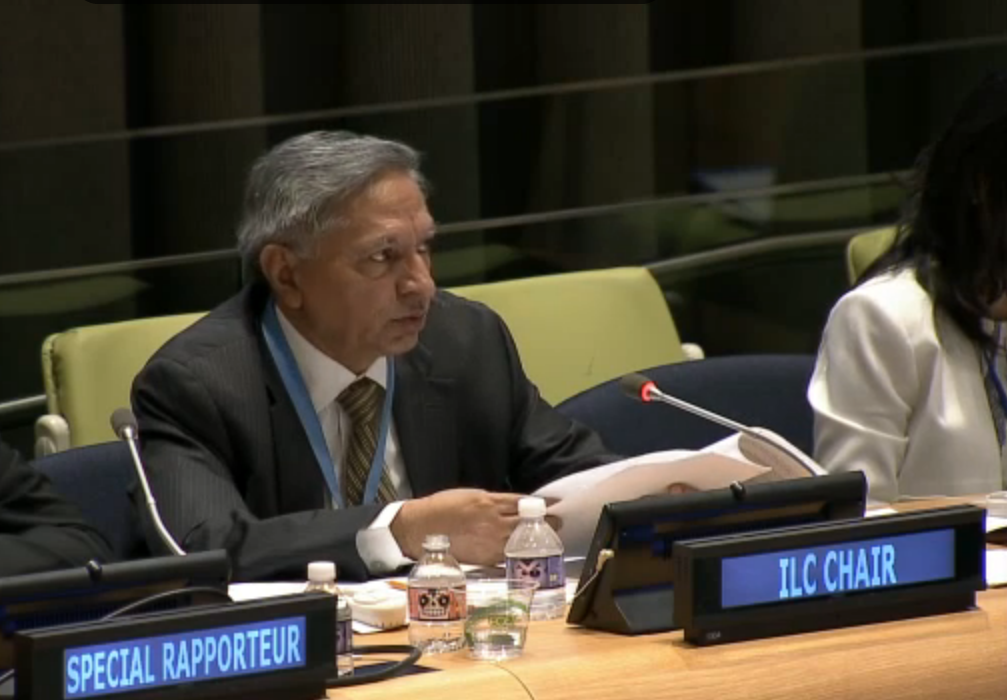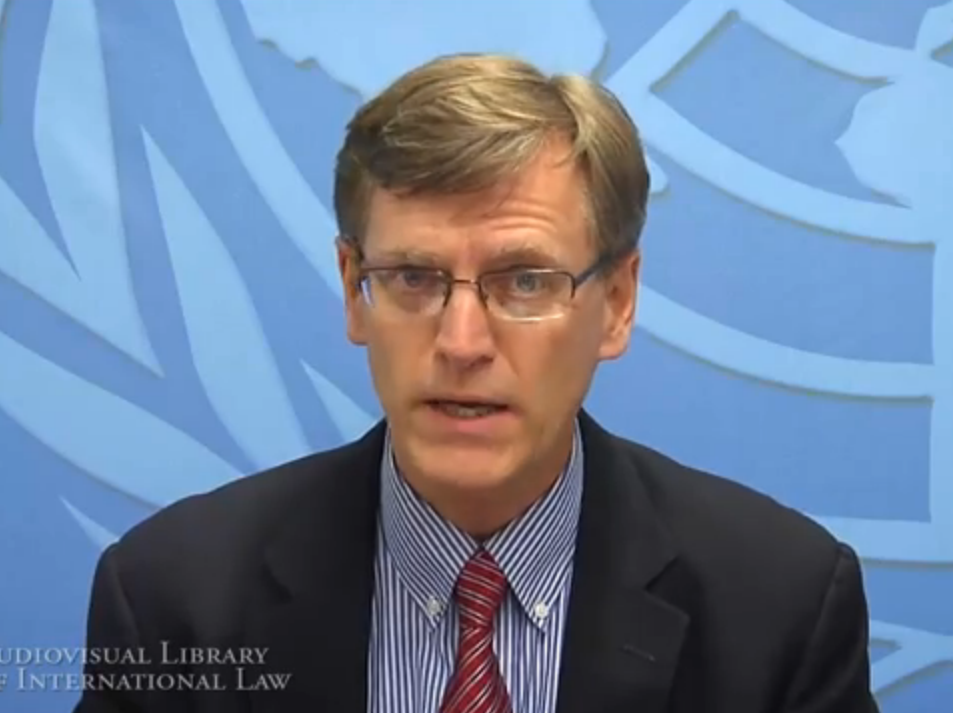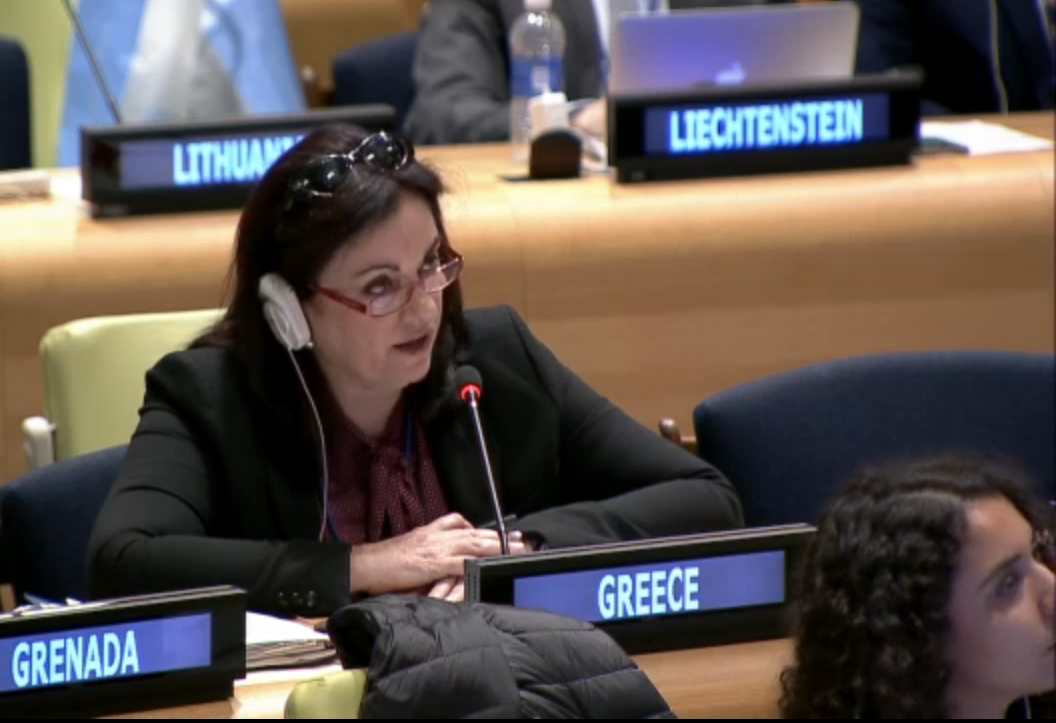By: Tamara L. Slater
Over the last three years, there has been an increasingly robust discussion within the United Nations about a new global convention on the prevention and punishment of crimes against humanity. A few weeks ago the UN General Assembly (UNGA) concluded its 70th session during which the Legal Committee, known as the Sixth Committee, considered such a convention. That discussion centered around Chapter VII of the Report of the 67th Session of the International Law Commission (ILC), based on an earlier Report put together by ILC Special Rapporteur on Crimes Against Humanity Sean D. Murphy that addressed “the potential benefits of developing draft articles that might serve as the basis of an international convention on crimes against humanity.” This year, as in the previous two, countries were overwhelmingly positive about the work done by Professor Murphy.

ILC Chair addressing the Sixth Committee during its 21st meeting on November 6, 2015. Source: UN Web TV.
During the Sixth Committee’s eight-week session, there were 37 country statements specifically addressing Professor Murphy’s Report and proposed draft articles for a global treaty on crimes against humanity. Within those statements, a number of themes stood out. First, many countries noted the severity of crimes against humanity and, therefore, the importance of holding perpetrators accountable. For example, the Hungarian government stated, “Hungary believes that crimes against humanity are among the most serious crimes that threaten the international community as a whole.” Such recognition is essential, given the nature of the crimes as well as the international cooperation and coordination required for effective prosecution and prevention.

Sean D. Murphy, Special Rapporteur on Crimes Against Humanity. Source: UN Web TV.
A second theme raised in many country statements was the importance of ensuring that a new global treaty does not conflict with the Rome Statute, which established the International Criminal Court (ICC) and includes crimes against humanity within the jurisdiction of the Court. Countries were primarily concerned that the definition be consistent with the Rome Statute, and noted that the Special Rapporteur and his draft articles appear to agree with said priority.
Many countries actively supported the endeavor. For example, the Government of Israel stated that it “would be honored to contribute to the drafting process of the new proposed treaty.” More often, States mentioned that they already had or were in the process of enacting domestic legislation addressing national prosecution for crimes against humanity. Since global treaties are ultimately ratified and enforced by individual States, such domestic legislation sends a signal to the international community that the issue is a priority. Furthermore, a treaty ensures consistency among national legislation. As The Netherlands said, “[i]t is of key importance… to ensure the connection between the relevant national judicial systems, so as to promote inter-State cooperation with respect to prosecution.”

Delegate from Greece addressing the Sixth Committee during its 20th meeting on November 4, 2015. Source: UN Web TV.
Finally, some countries noted their concern that a global treaty might compete with the Rome Statute and weaken the ICC. For example, Greece stated that “the risk of reopening during the future negotiation of a Convention the consensus reached on the definition of the crimes against humanity, as contained in Article 7 of the Rome Statute, cannot be excluded. Moreover,… such a convention may hamper efforts to achieve the universality of the Rome Statute.” Although such comments reflect hesitance to support a treaty, it shows that the primary divergence is over method, and not the goal. Country statements directly addressing the draft articles seem to agree that, as a global community, we must effectively prosecute and prevent crimes against humanity.
The responses of UN member states thus far are encouraging, but the work of the Special Rapporteur and Washington University’s Crimes Against Humanity Initiative is far from complete. The ILC report on the proposed draft articles were discussed among scholars, civil society, and members of the Commission at a recent workshop hosted by the International Nuremberg Principles Academy. Comments by these parties as well as statements made by States will be taken into account as the Commission moves towards the next phase of drafting a treaty. Another report to the ILC is expected in the first months of 2016 before the Commission meets again in Geneva for its 68th Session in the summer of 2016.
